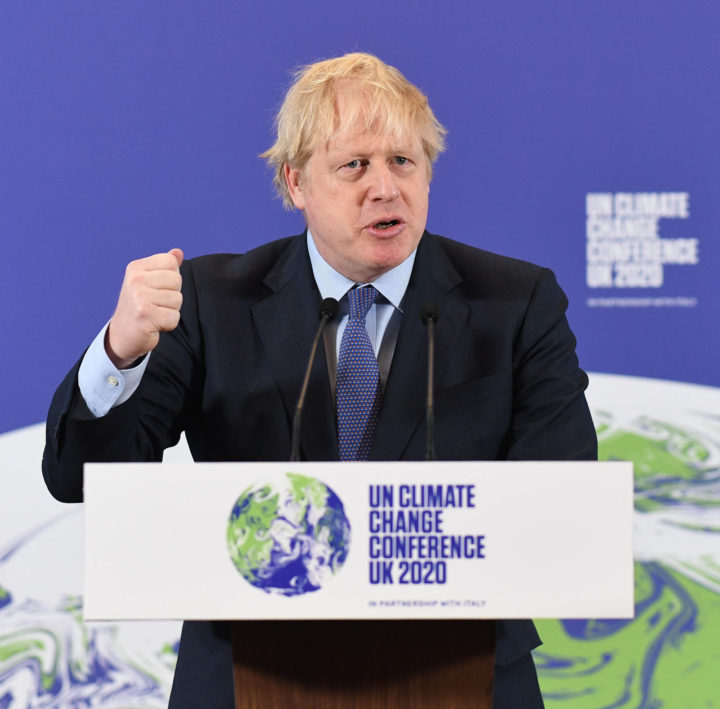COP26: A year and a half's work begins now
Governments highlight 'urgency' after climate summit rescheduling, but some seem more urgent than others

By Richard Black
@_richardblackShare
Last updated:
Not six months, then, as some had hoped and others expected; but the full 12.
Anyone hoping for a couple of weeks in Glasgow talking climate change at the postponed COP26 during (relatively) balmy June next year can keep the thermos flask and sou’wester out of the attic for now, after the Bureau of the United Nations climate convention confirmed the new dates as 1-12 November 2021, a year beyond its original slot.
Well – as confirmed as anything can be, given the unknowns of Covid-19. I haven't checked whether bookmakers are giving odds of every nation being open for international travel in 18 months’ time, but I very much doubt they are.
Momentum challenge
There’s no doubt that the initial decision to postpone COP26 from its original slot this November was inevitable; equally, there's no doubt that it knocked the momentum out of the preparations of governments, businesses and civil society, which were all gearing up for an increasingly frantic 2020.

For the most part, businesses have stopped talking about greening their supply chains and started discussing furlough schemes and bailouts. Governments likewise have focussed on R-rates rather than S-curves, and as for civil society – well, there’s a limit to how many times you can knock on a minister’s door, organise a petition or occupy an oil rig under lockdown.
Which is exactly why some would have preferred the summit rescheduled for May or June rather than November: shorter gap, more momentum.
So goes the theory, anyway. Against it were ranged a number of ultimately more persuasive arguments:
- Covid-19 means many governments won’t be able to focus on climate change and an energy transition until next year
- an earlier set of dates would have meant a greater risk of another postponement
- postponement or cancellation of other events critical in the buildup, such as the Commonwealth Heads of Government meeting slated for next month and yet to be rescheduled – means diplomatic momentum couldn’t be re-booted inside a year.
No delay
One thing on which everyone connected with the process seems to agree is that postponing COP26 for a year can't and shouldn't mean postponing national, regional or corporate action for a year. After all, what governments agree at a UN summit is largely a reflection of their own national plans and desires – a reflection of how the winds are blowing, as well as an opportunity to make them blow faster.

So, for example, we saw UK Prime Minister Boris Johnson declaring yesterday that once the ‘emergency phase’ of Covid-19 has passed, ‘we owe it to future generations to build back better and base our recovery on solid foundations’ – and vowing to link the UK’s ‘green’ economic recovery to COP26, making the national international.
We saw Italy’s Environment Minister Sergio Costa promising that ‘Between now and November 2021 we will take advantage of every international opportunity to increase ambition and mobilisation.’
International discussions continue too, with the UN climate convention hosting a series of online meetings over the next two weeks, as a partial replacement for the ‘intersessional’ talks that in normal years take place every June in Bonn.
2020 stand-off
However, there is a real difference between countries in terms of when formal elements of the 2015 Paris Agreement should be delivered.
In the Agreement, governments committed themselves to putting forward some key deliverables ‘by 2020’, not ‘by COP26’. And the nations most vulnerable to climate change impacts, the Least Developed Countries bloc (LDCs), want their more prosperous and bigger-emitting peers to stick to this schedule– their current chair, Bhutan’s Sonam Wangdi, saying:
‘While there will no longer be a COP this year, 2020 remains a critical year in which we still expect to see countries come forward with more ambition – through submission of updated nationally determined contributions (NDCs) that contain deeper emissions reductions targets; through communication of long-term strategies; and through the delivery of $100 billion (per year) in climate finance to support developing countries address climate change.
‘The postponement of the COP should not affect the resolve of countries to deliver on these commitments in 2020.’
By contrast, though the UK government’s proposal for re-scheduling COP26, there was much talk of keeping ambition alive, the question of delivering these key pledges in 2020 was conspicuous by its absence – reflecting the fact that the many governments, the host nation's among them, would prefer not to commit to such things until next year.
But it's hard to see in principle why they should not deliver in 2020. This has been written into the international timetable since 2015. Heck, developed nations first pledged back in 2009 to have the annual $100bn on the table this year. And making national commitments does not need an international summit.
Recovery COP
In truth, the dates for the rescheduled COP26 are less critical for its eventual outcome than a couple of other factors.
One is what happens in the next few months – whether key governments including the UK keep their climate change diplomacy active, whether businesses step forward with carbon-cutting pledges, whether citizens pump up the volume and ramp up the pressure.
The other is how many governments, and to what depth, integrate decarbonisation into their plans to reboot their economies.
The last time the world went through anything like this, in 2008, most governments didn’t. But this time there are several key differences – ‘green’ is in many cases now cheaper than ‘brown’, public demand for solutions to climate change is much more urgent, and investors are becoming ever more aware of risks to high-carbon investments.
Aligning the post-Covid recovery with net zero goals, then, is the key consideration for nation states.
Internationally, the rescheduling of COP26 opens up an opportunity for Boris Johnson's government to lead this on a global scale.
As well as hosting a UN climate summit next year, the UK will also preside over the G7 – which ought, logically, to play a major role in the post-Covid recovery. Twin tracks – economic re-growth and energy transition, seamlessly aligned.
What could be more alluring for a government now publicly committed to 'building back better' as well as delivering its own net zero target and holding back the tide of global climate change?
Share